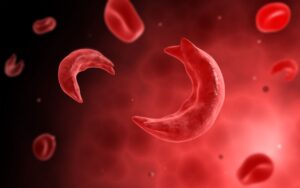GS2 – Social Sector

Context:
Launched in July 2023, NSCAEM has screened over 6 crore individuals in India, identifying 2 lakh sickle cell disease (SCD) cases and 16.7 lakh carriers. The mission aims to reach 7 crore screenings by FY26.
About Sickle Cell Disease (SCD):
- Nature: Genetic disorder caused by abnormal haemoglobin.
- Inheritance: Children have a significant risk of SCD if both parents carry the trait.
- Effects: Impacts red blood cells (RBCs), affecting oxygen transport.
- Symptoms: Pain, anaemia, jaundice, stroke, organ failure, etc.
- Treatment: Blood or bone marrow transplants can cure SCD but are limited by donor availability and risks.
Mission Objectives:
- Eliminate sickle cell anaemia as a public health problem in India before 2047.
- Implemented under the National Health Mission (NHM) in a mission mode.
Key Achievements:
- Mass Screening: 60.7 million individuals screened across 300+ districts in 17 high-prevalence states.
- Geographic Concentration: 95% of cases detected in Odisha, Madhya Pradesh, Gujarat, Chhattisgarh, and Maharashtra.
- Cost Efficiency: Diagnostic kit cost reduced from ₹100 to ₹28.
- Genetic Counselling: Awareness campaigns and counselling to prevent disease transmission.
- Health Cards: 26.3 million Sickle Cell Health/Genetic Status Cards issued.
- Centres of Excellence: 15 institutions designated for advanced care and diagnosis.
Future Plans:
- Awareness Expansion: Intensify counselling, awareness campaigns, and genetic card distribution.
- Community Engagement: Leverage local platforms for timely care for carriers and patients.
- Research Advancement: Support studies to refine interventions and generate actionable insights for SCD management.




